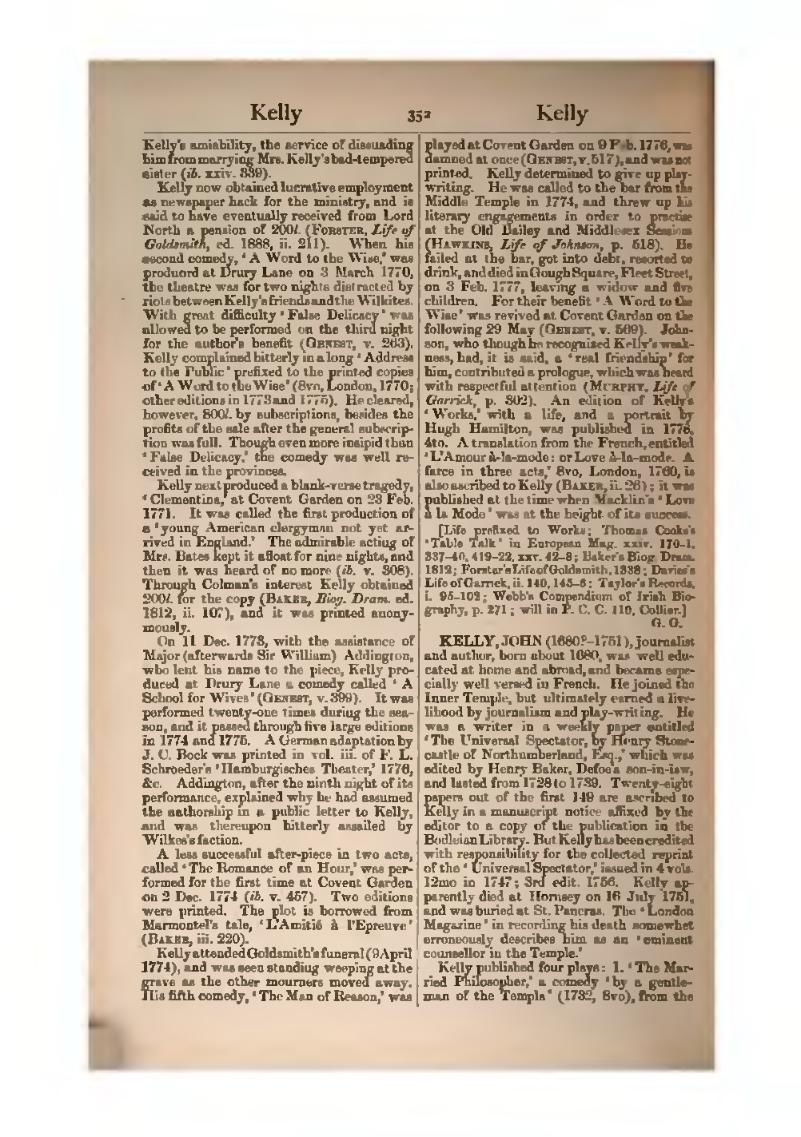Kelly's amiability, the service of dissuading him from marrying Mrs. Kelly's bad-tempered sister (ib. xxiv. 339).
Kelly now obtained lucrative employment as newspaper hack for the ministry, and is said to have eventually received from Lord North a pension of 200l. (Forster, Life of Goldsmith, ed. 1888, ii. 211). When his second comedy, ‘A Word to the Wise,’ was produced at Drury Lane on 3 March 1770, the theatre was for two nights distracted by riots between Kelly's friends and the Wilkites. With great difficulty ‘False Delicacy’ was allowed to be performed on the third night for the author's benefit (Genest, v. 263). Kelly complained bitterly in a long ‘Address to the Public’ prefixed to the printed copies of ‘A Word to the Wise’ (8vo, London, 1770; other editions in 1773 and 1775). He cleared, however, 800l. by subscriptions, besides the profits of the sale after the general subscription was full. Though even more insipid than ‘False Delicacy,’ the comedy was well received in the provinces.
Kelly next produced a blank-verse tragedy, ‘Clementina,’ at Covent Garden on 23 Feb. 1771. It was called the first production of a ‘young American clergyman not yet arrived in England.’ The admirable acting of Mrs. Bates kept it afloat for nine nights, and then it was heard of no more (ib. v. 308). Through Colman's interest Kelly obtained 200l. for the copy (Baker, Biog. Dram. ed. 1812, ii. 107), and it was printed anonymously.
On 11 Dec. 1773, with the assistance of Major (afterwards Sir William) Addington, who lent his name to the piece, Kelly produced at Drury Lane a comedy called ‘A School for Wives’ (Genest, v. 399). It was performed twenty-one times during the season, and it passed through five large editions in 1774 and 1775. A German adaptation by J. C. Bock was printed in vol. iii. of F. L. Schroeder's ‘Hamburgisches Theater,’ 1776, &c. Addington, after the ninth night of its performance, explained why he had assumed the authorship in a public letter to Kelly, and was thereupon bitterly assailed by Wilkes's faction.
A less successful after-piece in two acts, called ‘The Romance of an Hour,’ was performed for the first time at Covent Garden on 2 Dec. 1774 (ib. v. 457). Two editions were printed. The plot is borrowed from Marmontel's tale, ‘L'Amitié à l'Epreuve’ (Baker, iii. 220).
Kelly attended Goldsmith's funeral (9 April 1774), and was seen standing weeping at the grave as the other mourners moved away. His fifth comedy, ‘The Man of Reason,’ was played at Covent Garden on 9 Feb. 1776, was damned at once (Genest, v. 517), and was not printed. Kelly determined to give up play-writing. He was called to the bar from the Middle Temple in 1774, and threw up his literary engagements in order to practise at the Old Bailey and Middlesex Sessions (Hawkins, Life of Johnson, p. 518). He failed at the bar, got into debt, resorted to drink, and died in Gough Square, Fleet Street, on 3 Feb. 1777, leaving a widow and five children. For their benefit ‘A Word to the Wise’ was revived at Covent Garden on the following 29 May (Genest, v. 569). Johnson, who though he recognized Kelly's weakness, had, it is said, a ‘real friendship’ for him, contributed a prologue, which was heard with respectful attention (Murphy, Life of Garrick, p. 302). An edition of Kelly's ‘Works,’ with a life, and a portrait by Hugh Hamilton, was published in 1778, 4to. A translation from the French, entitled ‘L'Amour à-la-mode: or Love à-la-mode. A farce in three acts,’ 8vo, London, 1760, is also ascribed to Kelly (Baker, ii. 26); it was published at the time when Macklin's ‘Love à la Mode’ was at the height of its success.
[Life prefixed to Works; Thomas Cooke's ‘Table Talk’ in European Mag. xxiv. 170–1, 337–40, 419–22, xxv. 42–8; Baker's Biog. Dram. 1812; Forster's Life of Goldsmith, 1888; Davies's Life of Garrick, ii. 140, 145–6; Taylor's Records, i. 95–102; Webb's Compendium of Irish Biography, p. 271; will in P. C. C. 119, Collier.]
KELLY, JOHN (1680?–1751), journalist and author, born about 1680, was well educated at home and abroad, and became especially well versed in French. He joined the Inner Temple, but ultimately earned a livelihood by journalism and play-writing. He was a writer in a weekly paper entitled ‘The Universal Spectator, by Henry Stonecastle of Northumberland, Esq.,’ which was edited by Henry Baker, Defoe's son-in-law, and lasted from 1728 to 1739. Twenty-eight papers out of the first 149 are ascribed to Kelly in a manuscript notice affixed by the editor to a copy of the publication in the Bodleian Library. But Kelly has been credited with responsibility for the collected reprint of the ‘Universal Spectator,’ issued in 4 vols. 12mo in 1747; 3rd edit. 1756. Kelly apparently died at Hornsey on 16 July 1751, and was buried at St. Pancras. The ‘London Magazine’ in recording his death somewhat erroneously describes him as an ‘eminent counsellor in the Temple.’
Kelly published four plays: 1. ‘The Married Philosopher,’ a comedy ‘by a gentleman of the Temple’ (1732, 8vo), from the
